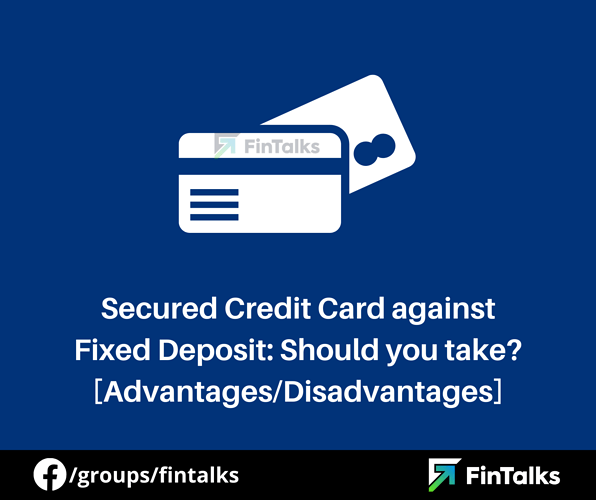Want to know about Secured Credit Cards against Fixed Deposits? You have come to the right place. Today we will discuss the pros and cons of secured credit cards. Let’s get started!
What is a Secured Credit Card?
Typically, credit cards are unsecured. This means they are issued without collateral. To break it further, it means: The financial institution does not take anything in return for the credit limit it issues to the card owner.
However, secured credit cards are issued to individuals by banks where they have to invest some money as Fixed Deposit with the bank. That FD becomes the collateral.
Why is a ‘Secured’ Credit Card issued?
A secured Credit Card is issued to individuals who do not have a credit score at all, or whose credit score is not good enough. This may happen if the person is new to the Credit Card world, and does not have a good credit history to make him/her creditworthy.
Here banks are happy to issue a credit card since the Fixed Deposit serves as security. Just in case the person defaults or cannot pay his dues, the bank can adjust it from the FD.
Advantages of a Secured Credit Card:
Helps to Generate a Credit Score:
If you are new to the world of Credit Cards and are not getting Credit Card approvals due to a lack of credit history, secured credit cards will help build your credit profile. As you start using your card and pay bills on time, your score will improve. Gradually you will be able to apply for unsecured credit cards also.
You can opt for any Credit Card even without fulfilling the eligibility criteria:
In the case of secured credit cards, banks do not see your Credit Score or your Income Source. They are happy to issue you most of their credit cards just on the basis of a Fixed Deposit as long as you pay the card membership fees.
Your Fixed Deposit Continues to Earn Interest:
Your FD will renew every year as you keep holding your credit card. It will be renewed at the regular interest rates with the bank.
Disadvantages of a Secured Credit Card:
You cannot Break the FD without surrendering your Credit Card:
This is self-explanatory. Your Fixed Deposit serves as the collateral against your Credit Card. So, you will only be able to redeem your FD after you close your card.
Your Credit Limit won’t Increase:
Typically, in the case of unsecured Credit Cards, the banks/financial institutions increase your Credit Limit with time depending on your Credit Card usage patterns and payment history. But in the case of secured credit cards, your credit limit will stay the same over time.
Moving from Secured to Unsecured Credit Card:
Sooner or later, you have to close your secured credit card. This is important to do, because:
-
You won’t be able to redeem your Fixed Deposit without giving up your Credit Card. So, your aim should always be to get an unsecured Credit Card within 6 months to 1 year. This can be from the same bank or any other bank.
-
As you know, the ‘Age’ of a Credit Card has an impact on your Credit Score. So, generally, it is recommended to keep your oldest (or second oldest) credit card active. So, your aim should always be to close the Secured credit card as soon as possible (and switch to an unsecured card that you can use for a long period of time).
Should you take a Secured Credit Card against Fixed Deposit?
In my opinion, this should be your last resort. First, try to get yourself a credit card normally. A lot of banks offer pre-approved Credit Cards, especially if you maintain high balance savings account with them for a few months or have high transactions. Try to grab credit cards from that.
If that is not possible, and if you are unable to use your Income Status to obtain a credit card, then you can surely go for an FD-based Credit Card.
However, remember to scout for other credit cards and surrender the FD-based card as soon as possible.
Last but not the least, if you have already got an unsecured credit card, please stay away from getting yourself secured credit cards. It is absolutely not recommended for you. Your credit score has started generating, and sooner or later, you should be able to get yourself high-value cards.
Thank you for reading. Don’t forget to join our FinTalks Facebook Group & FinTalks Telegram Channel for regular updates on banking and finance.
